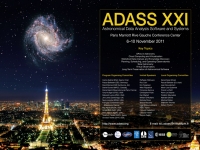Lucélia de Souza (Universidade Federal do Paraná, Universidade Estadual do Centro-Oeste), Maria Salete Marcon Gomes Vaz (UEPG, UFPR), Marcelo Emílio (UEPG), José Carlos Ferreira da Rocha (UEPG), Eduardo Janot Pacheco (IAG/USP), Rodrigo Boufleur (ON)
Abstract
CoRoT (COnvection Rotation and Planetary Transits) is a mission led by the French national space agency CNES, in collaboration with Austria, Spain, Germany, Belgium and Brazil. The mission priority is dedicated to exoplanet search and stellar seismology. CoRoT light curves database became public after one year of their delivery to the CoRoT Co-Is, following the CoRoT data policy. The CoRoT archive contains thousands light curves in FITS format. Several exoplanet search algorithms require detrend algorithms to remove both stellar and instrumental signal, improving the chance to detect a transit. Different detrend and detect transits algorithms can be applied to the same database. Tracking the origin of the information and how the data was derived in each level in the data analysis process is essential to allow sharing, reuse, reprocessing and further analysis. This work aims applying a formalized and codified knowledge model by means of domain ontology. It allows to enrich the data analysis with semantic and standardization. It holds the provenance information in the database for posteriori recovers by humans or software agents.Poster in PDF format
Paper ID: P144
Poster Instructions
|

